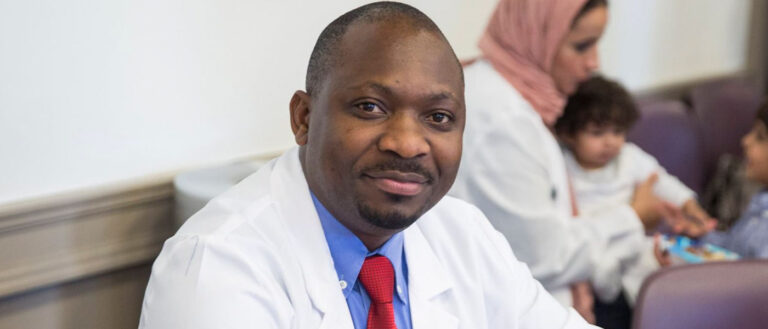When Fredrick Kizito completed his PhD in molecular virology at Case Western Reserve University in May 2022, he decided to apply his training in a familiar place. He’s now a postdoctoral scholar alongside Jonathan Karn in the Department of Molecular Biology and Microbiology at Case Western Reserve University School of Medicine—the same lab where he completed his PhD research.
Kizito’s research focuses on understanding the molecular basis of proviral HIV-1 latency and mRNA interactions with the nucleus to modulate its pathogenesis and long-term persistence. Ultimately, he hopes to establish an independent research career centered on HIV-1 persistence and developing technologies for designing a cure for HIV-1. He also hopes to share his experiences with international scholars of virology and infectious diseases at universities.
During his PhD program, Kizito developed CRISPR-based technologies to visualize latent HIV-1 proviruses in the native 3D chromatin of CD4+ T cells. Using this technology, he documented for the first time, the discovery that the Perinucleolar compartment is the nuclear site where HIV-1 proviruses establish latency, demonstrating how this subnuclear compartment was essential for supporting the proviral reactivation from latency. Now, he’s expanding the CRISPR-based technologies to include proviral HIV-1 detection in tissues, aiming to develop the “next-generation technology for quantifying proviral HIV-1 reservoirs” as the basis for evaluation of the HIV-1 cure therapeutic interventions.
He also focuses on mechanisms underlying the post-transcriptional nuclear regulation and retention of proviral messenger RNA (mRNA) by the nuclear ribonucleoprotein complexes in CD4+ T cells.
Kizito plays an active role in several organizations, including the Postdoctoral Association, the Rustbelt CFAR Center for AIDS Research (a partnership of CWRU and the University of Pittsburgh), and the American Association for the Advancement of Science.
Prior to coming to CWRU, Kizito was a lecturer assistant and laboratory technologist in the Department of Immunology and Molecular Biology at the College of Health Sciences at Makerere University in Uganda.
Learn more about Kizito’s experience as a postdoc.
Answers have been lightly edited for clarity and length.
1. How do you think the postdoctoral experience at CWRU is helping you prepare and advance toward your goals?
The postdoctoral experience is fully equipping me with deep and intuitive insights in my career of HIV-1 latency and persistence in preparation for an independent future career in HIV-1 research. Having my post-doctorate at CWRU has given me an opportunity to explore many resources, including the different associations and collaborations in the HIV-1 cure research like becoming a member of the Rustbelt CFAR and the CRISPR for Cure, among others. I have traveled to different parts of the world and within the U.S. for workshops and conferences, with the aim to contribute to the current developmental research in HIV-1.
2. What’s your best piece of advice on how postdocs can make the most of their postdoc career and prepare for their future goals?
The best advice for postdocs is to develop a positive mentality of acquiring competency skills that make them stand out of the crowd and yet are relevant to their future career. Also identify the most talented mentors who can nurture such skills they have acquired over the years.

